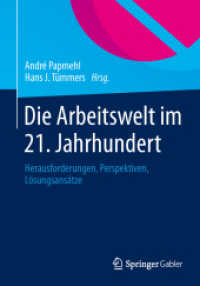- ホーム
- > 洋書
- > 英文書
- > Computer / General
Full Description
Computational Electromagnetics is a young and growing discipline, expanding as a result of the steadily increasing demand for software for the design and analysis of electrical devices. This book introduces three of the most popular numerical methods for simulating electromagnetic fields: the finite difference method, the finite element method and the method of moments. In particular it focuses on how these methods are used to obtain valid approximations to the solutions of Maxwell's equations, using, for example, "staggered grids" and "edge elements." The main goal of the book is to make the reader aware of different sources of errors in numerical computations, and also to provide the tools for assessing the accuracy of numerical methods and their solutions. To reach this goal, convergence analysis, extrapolation, von Neumann stability analysis, and dispersion analysis are introduced and used frequently throughout the book. Another major goal of the book is to provide students with enough practical understanding of the methods so they are able to write simple programs on their own. To achieve this, the book contains several MATLAB programs and detailed description of practical issues such as assembly of finite element matrices and handling of unstructured meshes. Finally, the book aims at making the students well-aware of the strengths and weaknesses of the different methods, so they can decide which method is best for each problem.
In this second edition, extensive computer projects are added as well as new material throughout.
Reviews of previous edition:
"The well-written monograph is devoted to students at the undergraduate level, but is also useful for practising engineers." (Zentralblatt MATH, 2007)
Contents
Introduction.- Convergence.- Finite Differences.- Eigenvalues.- The Finite-Difference Time-Domain Method.- The Finite Element Method.- The Method of Moments.- Summary and Overview.- Large Linear Systems.- Krylov Methods.








